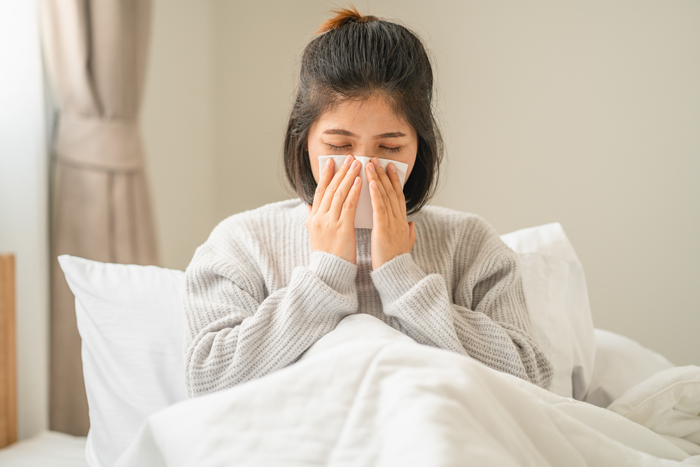Flu Care Treatment & Diagnostics in Karol Bagh, Delhi
Flu Care
The common cold and the flu are upper respiratory system illnesses, affecting nose, mouth, throat and lungs. Viruses cause such illnesses.
If you have the flu, you can consult general medicine doctors in New Delhi. A general practitioner is trained to handle adults' illnesses, whose basic treatment requires no surgery.
The expertise of the general medicine doctors in New Delhi is to diagnose symptoms and treat illnesses and diseases connected to different systems such as neurological, respiratory, cardiovascular, endocrine, gastrointestinal and hematological systems.

What are the symptoms of flu?
Common flu signs and symptoms include:
- Fever
- Muscle pain
- Chills and sweat
- Headache
- Shortness of breath
- Fatigue or weakness
- Runny nose
- Diarrhea and vomiting
- Dry, persistent cough
- Sore throat
What causes the flu?
The influenza virus infects the throat, nose and lungs, causing the flu. These infections spread when people cough, sneeze or speak, releasing droplets into the air and perhaps into the mouths or noses of people nearby. You may also get the flu by touching a flu virus surface or item and then touching your eyes, mouth or nose.
When do you need to see a doctor?
The majority of individuals who have the flu can treat it at home and need medical attention only in rare cases.
If you get flu symptoms and are worried about complications, see general medicine doctors in Karol Bagh.
Antiviral medicines may help you get well faster and prevent more serious problems. If you experience flu-like symptoms, get medical attention immediately. Adults may suffer the following indications and symptoms of emergency:
- Chest discomfort
- Persistent dizziness
- Seizures
- Worsening of existing medical problems
- Severe muscular weakness or pain
- Breathing difficulties
Request an appointment at Apollo Spectra Hospitals, Karol Bagh, New Delhi.
Call 1860 500 2244 to book an appointment.
What are the risk factors?
Factors that might raise your risk or complications of flu include:
- Age - Seasonal influenza tends to affect children between 6 months and five years and seniors between 60 and 65 years of age.
- Conditions of living or working - People who live or work in institutions with a lot of other people, such as nursing homes or military barracks, are more prone to getting the flu. People working at a hospital are also at an increased risk.
- Weakened immune system: Cancer therapies, anti-rejection medicines, long-term usage of steroids, organ transplants, blood cancer or HIV/AIDS might weaken your immunity. It can make it easier for you to get flu and can also raise your risk of complications.
- Chronic disease - The risk of flu complications may increase when there is a chronic illness such as asthma, diabetes, cardiovascular disease, disorder of the nervous system, metabolic disorder, abnormality of airway and kidney and liver or blood condition.
- Pregnancy - Complications of flu are more frequent in pregnancy. Women are more prone to suffering from issues related to flu until two weeks after delivery.
- Obesity - People with a 40 or higher body mass index (BMI) have an elevated risk of flu complications.
What are the possible complications?
Usually, if you are young and healthy, the flu is not dangerous. Despite how miserable you may feel, the flu typically goes in a week or two with no long-term consequences. On the other hand, children and adults who are at risk may have complications such as:
- Pneumonia
- Bronchitis
- Flare-ups of asthma
- Heart issues
- Infections of the ear
- Severe respiratory distress syndrome
What is the treatment for the flu?
Most people with the flu who otherwise are healthy do not require specific medicines or therapies. Take the following measures if you have the flu:
- Drink plenty of water.
- Eat light meals.
- Stay at home.
- Rest.
Conclusion
If you become sick with the flu and are at high risk of developing flu complications or if you have concerns about your condition, you may always call your doctor for advice.
If you decide to visit a doctor's office or emergency room, make sure that you wear a face mask if you have one. Hands should be washed and coughs and sneezes covered to prevent the infection from spreading.
References:
https://www.webmd.com/cold-and-flu/coping-with-flu
Anyone who is exposed to the flu virus is at risk of infection.
In general, doctors can diagnose the flu based on its symptoms. Sometimes your doctor may recommend a test to check if the influenza virus is present in your body.
In a week or two, most individuals who get the flu recover. Symptoms usually disappear after 3 to 5 days. If your symptoms get worse or stay the same even after a week, get emergency medical treatment. As many individuals die of flu each year, treatment of the infection and complications are essential. If there are significant problems, they can be treated with medical attention.
Our Top Specialities
NOTICE BOARD
CONTACT US
CONTACT US
 Book Appointment
Book Appointment


.svg)
.svg)
.svg)
.svg)








